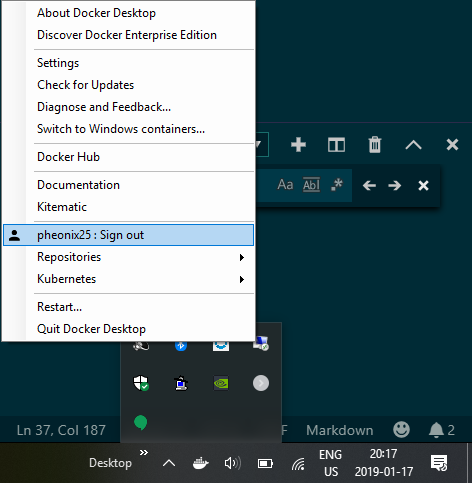GitHub Pages, Docker, and Jekyll
It’s been a while since I wrote about setting up my blog for local testing using Docker and Docker Toolbox, and the rest of the ecosystem has moved on. So it’s time for an update…

For those of you that followed along at the beginning, I wrote about how to set up your blog to run locally, how to run from GitHub Pages, and I even provided BuildAndRun and StopAndRemove scripts, but as I’m getting back into writing in 2019, and I wanted to update some parts of my site, those … stopped working!
Keeping in mind I’ve changed laptops 3 times in the past few years, and have just been “pushing small changes to master” (aka. lazy trunk-based development) for about as long (I know, I know), so today I spent far too much time trying to work around the bugs I was experiencing in getting Jekyll running locally before I decided to step back and “read the docs”.
I figured I’d type this up so that you - and future me - don’t have the same troubles I did today. In this post, I’ll step through the errors I experienced, and how I solved them., Let’s get straight into it:
Issues I experienced
- Docker Hub credentials were invalid
- Docker Compose command changed
- Container “running”, but no content returning from 0.0.0.0
- Website rendered without CSS
- Starefossen no longer up to date
- Container not accepting updates
Docker Hub credentials were invalid
My Docker script (note, not Docker Compose) refused to find images, and even though my Docker icon in the notification area showed me as “logged in”, it wouldn’t locate any images because “my credentials for Docker Hub were invalid”. I went to hub.docker.com and confirmed that my credentials that were saved had not been changed, and everything looked fine locally.
Thankfully the solution was quite simple: Right click on the Docker icon in the Windows notification area, and choose “Sign out”. Wait for it to finish logging you out and then sign in again.

Simple, right? Unfortunately, I lost about half an hour to this because everything “looked right”, but the credentials had expired in the background.
Docker Compose command changed
Previously, I was using raw Docker commands, like this, in a Dockerfile to get the site up and running. I even tried out a docker-compose.yml years ago and… that worked back then, but like I said in the intro, the community has moved on. It was time to get with the cool new kid in town: Docker Compose 2.0 (or 2.1, or 3.0), but a lot of the syntax has changed.
You can see the changes I needed to make in this diff that I pushed once I’d solved all the problems below.
Container “running”, but no content returning from 0.0.0.0
Great, so now we have our container up and running, and we can watch Jekyll recompile the pages on the command line as we’re making changes… but we go to http://0.0.0.0:4000 and … nothing! Weird, the config looks fine, and this did work before. Changing it from using the ANY IP (0.0.0.0) to localhost or the loopback IP (127.0.0.1) did nothing different. Nothing was servicing those IP/Port combinations.
Now this is nothing new, there has been a limitation on Windows networking + Docker for a long time, but my scripts were aware of this, and we were using the right IP for the specific container up until we moved to Windows version 1809, and now “it should just work”, but it didn’t.
NOTE: If you’re using a Windows version LESS THAN 1809, you can follow the steps in this StackOverflow answer.
After a long time, I had realised that this laptop had recently been re-configured, and the Windows firewall was blocking this as “outbound traffic”. After recategorising my WiFi network to Private, everything “just worked” as expected.
Website rendered without CSS
Jekyll, when it starts, looks for the configured host:port/baseurl structure by lifting that out of _config.yml, and uses this combination when rendering URLS for the site - including CSS & Javascript files. My configuration was set to use http://hermens.com.au as site.url, but no HOST was specified.
The solution for me was to use configuration overloading in the Docker Compose command: jekyll serve --config _config.yml,_config.docker.yml, which according to the docs mean that any values that match in later files will replace earlier files. Adding the _config.docker.yml and overriding the url value to http://localhost:4000 fixed this for me.
Since I’ve been looking into it though, this is NOT the suggested way to do this, and instead I should be setting the site.host and site.port values for use when debugging locally. Looks like I still have an outstanding change to make here :)
Starefossen no longer up to date
For a long time, I advised people to use the latest image from Starefossen, but this is now a bit out of date. To get a better experience locally with Jekyll, it’s advised to use the official jekyll/jekyll:pages instead. I don’t think there’s anything wrong, per-se with the Starefossen image, it’s just that it’s not actively updated in the same way that the official Jekyll images are.
Container not accepting updates
This was a fun one. After I changed from Starefossen to Jekyll docker images, my files weren’t being watched. Everything was running, but the build wasn’t recompiling pages.
According to the documentation --watch should be enabled by default when using jekyll serve, but wasn’t for me… I needed to manually add --watch and --force_polling to the Docker Compose command, so it became even longer: jekyll serve --force_polling --watch --config _config.yml,_config.docker.yml. Quite a mouthful by now.
Results
I have a bunch of new/updated scripts & config to run everything locally for me:
Docker.BuildAndRun.ps1andDocker.StopAndRemove.ps1- the diff is here.docker-compose.ymlwas updated._config.ymlwas expanded & is overridden by_config.docker.ymlthat matches theJEKYLL_ENVenvironment variable.- …and the old
dockerfilecan now be removed.
As an added bonus, thanks to these upgrades, I can now just do docker-compose up and docker-compose down if I wish!
I hope this helps you as much as it will help future me :) Cheers.
One response
Leave a comment